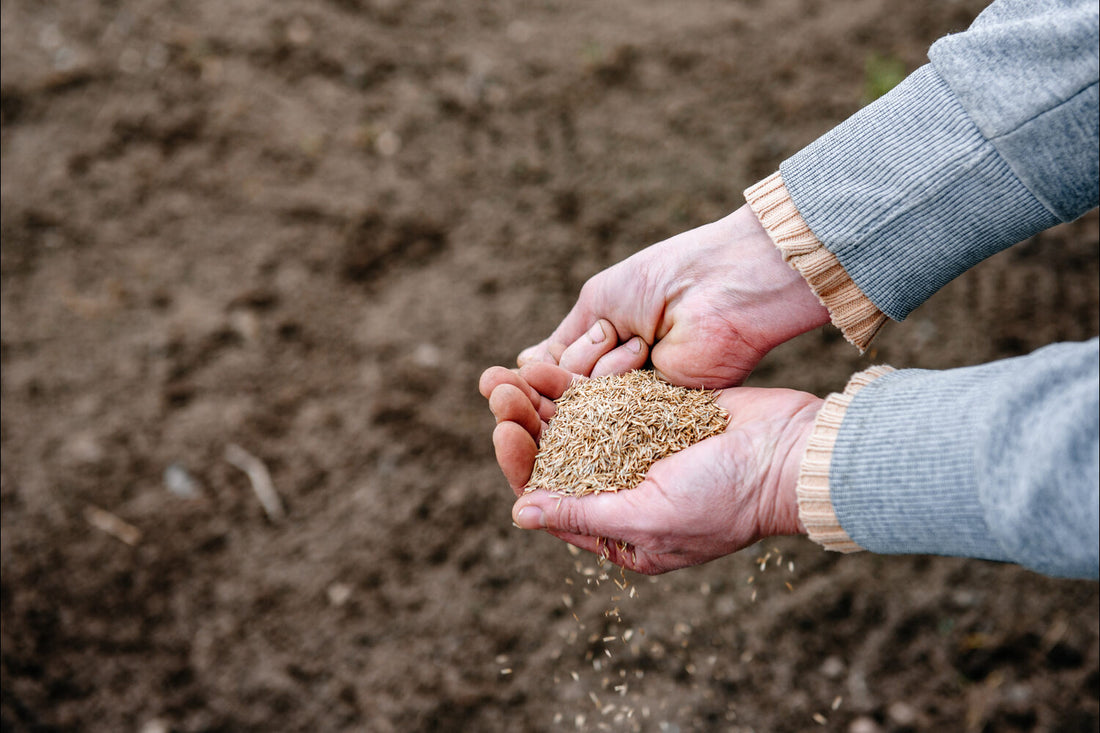When it comes to maintaining a beautiful lawn in Texas, the grass seed you choose can make all the difference.
Texas is notorious for its scorching summers, mild winters, and unpredictable rainfall, so selecting a seed that can handle these extremes is key.
If you're struggling to find the best grass seed for texas, you've come to the right place. In this article, we'll dive into the top grass seed options that thrive in Texas' unique climate, including the pros and cons of each type.
We'll also touch on important factors to consider when planting your grass seed. So, if you're ready to discover which grass will give your lawn that lush, green look all year round, continue reading for expert insights and tips.
What this article covers:- What Is the Best Grass Seed for Texas?
- Common Grasses Used in Texas
- Things to Consider When Planting Grass Seed in Texas
What Is the Best Grass Seed for Texas?
Based on our observations, the best grass seed for Texas depends on factors like climate, soil, and your lawn care routine. Below, we break down three great choices that can transform your Texas lawn into the envy of your neighborhood.
Tall Fescue
Tall Fescue is a cool-season grass that thrives particularly well in northern Texas, where the summers are not as intense.
Known for its deep root system, this grass stands out due to its excellent drought resistance, allowing it to stay green and lush longer into the year.
Its soft texture also makes it a favorite for families who spend time on their lawn. However, Tall Fescue may face challenges in extreme heat, especially in the southern parts of Texas, unless consistent watering and maintenance are provided.
For those looking for a high-quality grass seed, we recommend the Envy Premium Tall Fescue Grass Seed Blend. This blend includes three top-performing Tall Fescue varieties: Saltillo, Raindance, and Lifeguard, each chosen for their unique strengths.
Saltillo offers exceptional drought tolerance and a vibrant green color, while Raindance ensures disease resistance and fast germination.
Lifeguard, on the other hand, brings high wear tolerance, making it ideal for lawns that see a lot of activity. Together, these varieties create a resilient, visually appealing lawn.
The blend's features, such as drought resistance, disease prevention, and superior wear tolerance, make it perfect for families seeking a durable and attractive lawn.
Bermuda Grass
Bermuda grass is a warm-season grass highly favored by homeowners across Texas due to its resilience and adaptability to the state's hot and dry climate.
This grass thrives in full sunlight and is well-known for its drought tolerance, making it ideal for regions that experience long, hot summers.
One of the key advantages of Bermuda grass is its rapid growth and ability to recover quickly from foot traffic, which makes it a perfect choice for lawns that see a lot of activity, whether from kids, pets, or outdoor gatherings.
As trusted experts, we've found that Bermuda grass requires minimal maintenance, handling Texas' tough conditions with ease.
Its robust root system and quick-growing nature mean you'll have a lawn that remains green and lush even in the face of extreme heat.
For those looking for a durable, low-maintenance lawn solution, Bermuda grass offers everything you need to create a beautiful and resilient yard.
Perennial Ryegrass
Perennial Ryegrass is an excellent option for those wanting to establish a thick, green lawn quickly, particularly during the cooler months.
This grass type germinates rapidly, making it ideal for overseeding when your Bermuda grass begins to fade in the fall.
While it doesn't thrive in the extreme summer heat of Texas, it works well alongside Bermuda grass during the winter months to maintain a vibrant, green lawn year-round.
Known for its fine blades, Perennial Ryegrass not only offers a lush look but also provides a soft, attractive texture to your lawn.
Its adaptability to cooler conditions, combined with its ability to germinate quickly, makes it a popular choice for those seeking fast results.
However, it does require regular maintenance to keep it looking its best, especially when transitioning between warm and cool seasons.

Common Grasses Used in Texas
In addition to the popular choices like Bermuda grass, other common grasses used in Texas include Zoysia and St. Augustine grass.
Zoysia grass is known for its fine texture, shade tolerance, and ability to thrive in a variety of soil conditions, making it a great choice for homeowners looking for a low-maintenance, resilient lawn.
St. Augustine grass, on the other hand, is preferred in coastal regions of Texas because of its excellent salt tolerance and ability to withstand moderate shade.
Both are warm-season grasses that provide a dense, lush appearance, but they vary in their care requirements and appearance.
Understanding the specific needs of your region, whether it's the drier areas of Texas or more humid coastal zones, is essential for choosing the right grass.
Whether you're looking for the best grass seed for south carolina or the best grass seed for new england, it's crucial to match your grass choice to the local climate and soil conditions for the best results.

Things to Consider When Planting Grass Seed in Texas
Before you rush to plant, there are a few things to keep in mind:
- Soil Preparation: Before planting, it's critical to loosen the soil and remove any weeds to give your seeds the best chance of germination. Seeds will struggle to grow in compacted soil or if they're competing with weeds. Consider using a hoe or garden rake to break up the soil surface and eliminate visible weeds.
- Watering: Proper watering is key to ensuring that your grass seed establishes deep roots, especially during Texas' hot summers. Newly planted grass needs regular watering—typically, you'll want to keep the soil consistently moist but not waterlogged. A frequent, light watering schedule is best during the first few weeks.
- Sunlight Exposure: Make sure you're selecting a grass type suited to the sunlight levels in your yard. Bermuda grass, for example, thrives in full sun, while St. Augustine grass does well in shaded areas. Understanding your lawn's sun exposure will help you choose the right seed and ensure its success.
- Fertilization: Using organic or landscaper-grade fertilizer can significantly boost grass growth and durability. Fertilizing after planting will supply essential nutrients and promote faster, stronger development, allowing your lawn to withstand the Texas climate over time.
Conclusion
Choosing the best grass seed for Texas requires careful consideration of your region's climate, soil conditions, and the level of maintenance you're willing to commit to.
From the heat-tolerant durability of Bermuda to the year-round vibrancy of Ryegrass or the rugged resilience of Tall Fescue, the right choice will make all the difference in achieving a thriving lawn.
With Lawn Synergy's proven expertise, you can confidently choose the grass seed that best suits your needs. If you're ready to transform your lawn into the best on the block, we're here to help.
Contact Lawn Synergy today for expert advice, premium grass seed options, and tailored lawn care solutions designed just for you.
If you want to learn more, why not check out these articles below:
- Best Grass Seed for North Carolina
- Best Grass Seed for Minnesota
- Best Grass Seed for Virginia
- Best Grass Seed for Michigan
- What Happens If You Apply Fertilizer to Wet Grass?
- What Does Fertilizer Do for Grass
- Best Fertilizer to Make Grass Green
- Will Fertilizer Burn Grass If Not Watered
- When to Fertilize New Grass Seed
- When to Fertilize Lawn in Spring
- When to Weed and Feed Lawns
- When to Fertilize Centipede Grass
- When to Fertilize St. Augustine Grass
- When Is It Too Cold to Fertilize Lawn
- When to Fertilize Lawn in Florida





